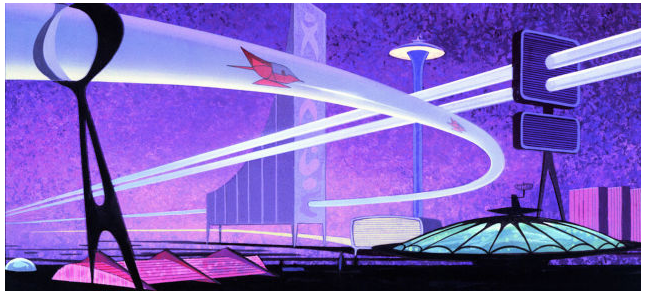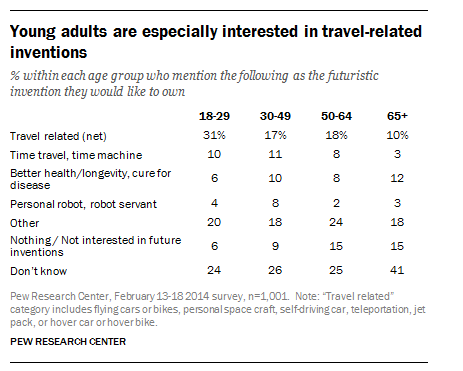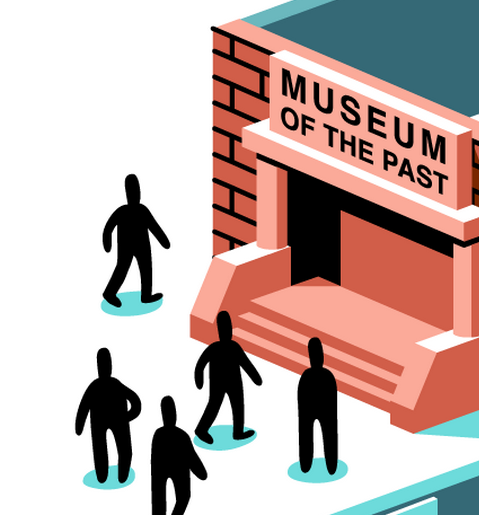Why is the Future So Boring?
 Last week I asked a group of undergraduate students in my history of technology course to express some thoughts about the technological future - what sorts of changes related to technology did they expect to see coming over the horizon? Their comments really surprised me. I'll come back to those in just a minute...My curiosity was raised by a recent flurry of interest around a recently released report jointly sponsored by the Pew Research Center and the Smithsonian. A snapshot of the title page is below; some readers may wonder about the odd conflation of science with technology here, a distinction that pollsters didn't seem to plumb. Although this would doubtless set Paul Forman's head spinning wildly, let's set aside how this elides about 30 years of scholarship in science and technology studies.
Last week I asked a group of undergraduate students in my history of technology course to express some thoughts about the technological future - what sorts of changes related to technology did they expect to see coming over the horizon? Their comments really surprised me. I'll come back to those in just a minute...My curiosity was raised by a recent flurry of interest around a recently released report jointly sponsored by the Pew Research Center and the Smithsonian. A snapshot of the title page is below; some readers may wonder about the odd conflation of science with technology here, a distinction that pollsters didn't seem to plumb. Although this would doubtless set Paul Forman's head spinning wildly, let's set aside how this elides about 30 years of scholarship in science and technology studies. The Pew-Smithsonian report was based on a phone survey of about 1,000 Americans (the question set and response data are here) with the goal of trying to gauge "public attitudes about a variety of scientific and technological changes" over the next half century. Besides asking respondents whether they believed technology would change things for the better or worse, Pew pollsters also asked about more specific things such as whether computers would be able to create "important works of art" (while important is a relative concept, computers actually can already do this) and if humans will be able to "control the weather" (substitute "modify" for control and, again - ditto).Overall, Americans - based on Pew's data - appear positive about the future. 59% of people thought the future would be "mostly better" because of technology. A closer look at the numbers shows some interesting bias for gender and education - well-educated and well-paid men are most likely to take a positive view; women tend to trend more negative Where concern about particular technologies was voiced, it was often around technologies that are in the news now - driverless cars, drones, wearable computers, and so on. When asked what "futuristic invention they would most like to own," Americans seem to desire a technological future based on practicality - 9% would like to see improved health and longevity - as well as implausibility - 9% would also like a time machine. (These top two responses were tied...not surprisingly, the ubiquitous and always over the horizon flying car pulled up 2nd.)
The Pew-Smithsonian report was based on a phone survey of about 1,000 Americans (the question set and response data are here) with the goal of trying to gauge "public attitudes about a variety of scientific and technological changes" over the next half century. Besides asking respondents whether they believed technology would change things for the better or worse, Pew pollsters also asked about more specific things such as whether computers would be able to create "important works of art" (while important is a relative concept, computers actually can already do this) and if humans will be able to "control the weather" (substitute "modify" for control and, again - ditto).Overall, Americans - based on Pew's data - appear positive about the future. 59% of people thought the future would be "mostly better" because of technology. A closer look at the numbers shows some interesting bias for gender and education - well-educated and well-paid men are most likely to take a positive view; women tend to trend more negative Where concern about particular technologies was voiced, it was often around technologies that are in the news now - driverless cars, drones, wearable computers, and so on. When asked what "futuristic invention they would most like to own," Americans seem to desire a technological future based on practicality - 9% would like to see improved health and longevity - as well as implausibility - 9% would also like a time machine. (These top two responses were tied...not surprisingly, the ubiquitous and always over the horizon flying car pulled up 2nd.) For some reason, younger Americans seem especially interested in time travel. The data don't explain why although a cynic might suggest millennials wish to travel to the future to see how badly their parents have screwed things up. However, I should note that none of my students mentioned anything to do with time machines or faster than light travel. Ours is a serious class, I suppose.
For some reason, younger Americans seem especially interested in time travel. The data don't explain why although a cynic might suggest millennials wish to travel to the future to see how badly their parents have screwed things up. However, I should note that none of my students mentioned anything to do with time machines or faster than light travel. Ours is a serious class, I suppose. The appearance of the Pew-Smithsonian report was met with a colorful graphic/article in The New York Times titled "A Vision of the Future form Those Most Likely to Invent It." The respondents were a line-up of the usual suspects -mostly men, all from or with ties to Silicon Valley.
The appearance of the Pew-Smithsonian report was met with a colorful graphic/article in The New York Times titled "A Vision of the Future form Those Most Likely to Invent It." The respondents were a line-up of the usual suspects -mostly men, all from or with ties to Silicon Valley. As one might expect, their viewpoints were consistent and commensurate with people who spend a lot of the professional lives traveling to, from, and around Sand Hill Road and Stanford - drones, implantable chips, virtual reality (again?), and so on. The focus seemed to be on ease and availability of services in the future. As one of Twitter's co-founders said, "The march of technology is the incessant march of convenience.” Apparently he hasn't had to deal with a credit bureau recently.My favorite commentary on both the Pew report and the NYT response came from Matt Novak who writes amusing, provoking and sometimes biting blog posts for Gizmodo at Paleofuture. As Novak notes, what is striking about many of these visions of future tomorrows aren't new at all - they are "the dreams of yesterday's tomorrows as well." His excellent blog post does a fantastic job of taking the professionals' prognostications and showing that these ideas have been circulating for years if not decades already.Fifty years ago, New York City hosted the 1964 World's Fair. Much of the fair was about the future. And much of the future that corporate America teased Americans with is the same sort of future that Americans (and the NYT's experts) are still waiting for. In 1964, sci-fi writer Isaac Asimov made his own predictions as to what the future would be like in 1964. What did he predict? Robots, driverless cars, a global village of communication, smarter computers...pretty much the same sort of stuff that average Americans and Silicon Valley experts are imagining now. Has the future become static? Or are the experts just as likely to be right or wrong as anyone else?
As one might expect, their viewpoints were consistent and commensurate with people who spend a lot of the professional lives traveling to, from, and around Sand Hill Road and Stanford - drones, implantable chips, virtual reality (again?), and so on. The focus seemed to be on ease and availability of services in the future. As one of Twitter's co-founders said, "The march of technology is the incessant march of convenience.” Apparently he hasn't had to deal with a credit bureau recently.My favorite commentary on both the Pew report and the NYT response came from Matt Novak who writes amusing, provoking and sometimes biting blog posts for Gizmodo at Paleofuture. As Novak notes, what is striking about many of these visions of future tomorrows aren't new at all - they are "the dreams of yesterday's tomorrows as well." His excellent blog post does a fantastic job of taking the professionals' prognostications and showing that these ideas have been circulating for years if not decades already.Fifty years ago, New York City hosted the 1964 World's Fair. Much of the fair was about the future. And much of the future that corporate America teased Americans with is the same sort of future that Americans (and the NYT's experts) are still waiting for. In 1964, sci-fi writer Isaac Asimov made his own predictions as to what the future would be like in 1964. What did he predict? Robots, driverless cars, a global village of communication, smarter computers...pretty much the same sort of stuff that average Americans and Silicon Valley experts are imagining now. Has the future become static? Or are the experts just as likely to be right or wrong as anyone else? This brings me back to my students' imaginings of the future. They're a typical group of 19-21 year old, mostly from California, and ethnically diverse. There was nary a "time machine" among them. Nor any driverless cars (although they were gobsmacked yet resolutely skeptical when I showed them a short video of the flying car you can buy soon...maybe). What did they imagine? Sure, there were some who posited better smart phones and such. But most of their responses skewed toward technologies for more sustainable living - green buildings was a popular choice as were more energy efficient technologies - or that would promote some sort of social change. (The only sort of thing the NYT's experts noted was a projected increase in philanthropy from the "bow wave of uncounted billions" sloshing around Silicon Valley now...none had much to say about environmentally oriented technologies or the ecological effects of billions of more smart phones, drones, etc.).This led me to wonder: Are the predictions for the future that we have with us now - many of which have been stinkin' up the joint, so to speak, for five decades or more - stale and spoiled because they lack an explicit social dimension? If so, maybe this suggests the need to focus less on the devices and doo-dads and the driverless cars and instead engage more with what sorts of social changes we might want to see in the future.
This brings me back to my students' imaginings of the future. They're a typical group of 19-21 year old, mostly from California, and ethnically diverse. There was nary a "time machine" among them. Nor any driverless cars (although they were gobsmacked yet resolutely skeptical when I showed them a short video of the flying car you can buy soon...maybe). What did they imagine? Sure, there were some who posited better smart phones and such. But most of their responses skewed toward technologies for more sustainable living - green buildings was a popular choice as were more energy efficient technologies - or that would promote some sort of social change. (The only sort of thing the NYT's experts noted was a projected increase in philanthropy from the "bow wave of uncounted billions" sloshing around Silicon Valley now...none had much to say about environmentally oriented technologies or the ecological effects of billions of more smart phones, drones, etc.).This led me to wonder: Are the predictions for the future that we have with us now - many of which have been stinkin' up the joint, so to speak, for five decades or more - stale and spoiled because they lack an explicit social dimension? If so, maybe this suggests the need to focus less on the devices and doo-dads and the driverless cars and instead engage more with what sorts of social changes we might want to see in the future.